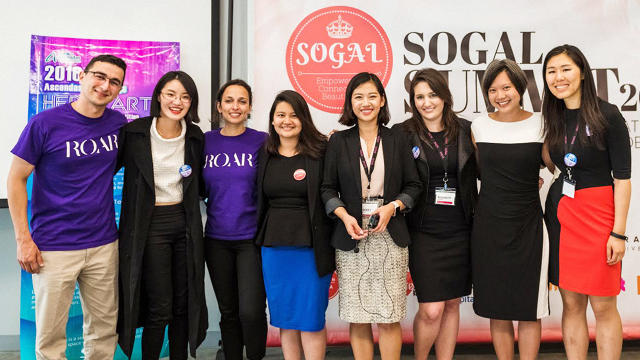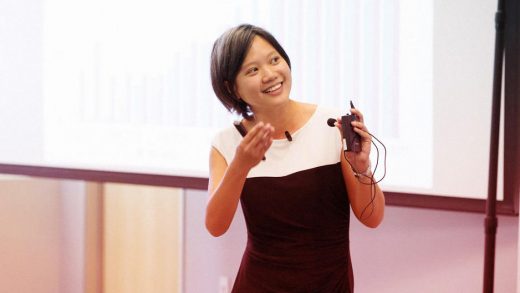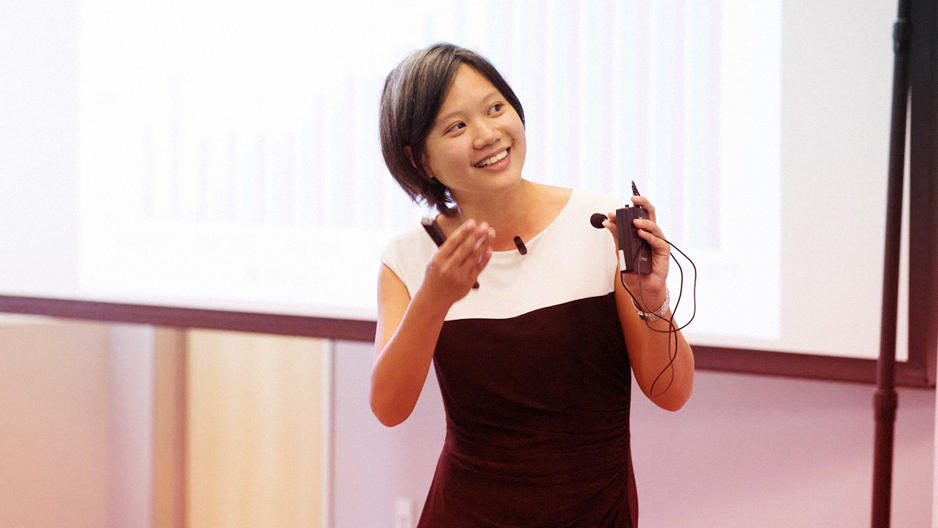The Indonesian Startup That Wants To Empower Women With Prepaid Phone Credits
Her Startup, the world’s first female-focused Trans-Pacific startup competition, held its finals in July in Northern California. Jointly organized by Ascendas Singbridge, SoGal Ventures, TechBase, Lean In China, and Kr Space, the contest was part of the female entrepreneurship conference SoGal Summit and was designed to bolster fledgling companies from Asia and the U.S. that have at least one female cofounder or focus on products or services that help women. A financial technology company from Indonesia called Wobe walked away as the inaugural winner, beating out applicants from Vietnam, China, the U.S., and Singapore.
Founded by 31-year-old Adrianna Tan, Wobe is an app designed to help Indonesians—particularly women—set up their own businesses. Wobe develops tools that address financial inclusion in developing economies like Indonesia, where most transactions are cash-based. In Indonesia, buying and selling prepaid mobile phone credits is a part of everyday life, but there are often so many middlemen ratcheting up prices that making a profit can be challenging.
The Wobe app cuts out these middlemen and allows anyone with an Android phone to buy in with a minimal investment of $5 directly from the three major Indonesian carriers. The app also tracks the purchase for maximum transparency. Wobe users can then use the same technology to start their own digital businesses specializing in the sale of phone airtime, electricity, electronic train tickets, and water vouchers. While the app is not intended exclusively for women, Tan is targeting them in an effort to empower an overlooked demographic.
There’s a reason Her Startup saw the potential in Wobe. Indonesia is the fourth-largest telecommunications market in the world, with 278 million subscribers. Among those subscribers is a large proportion of the “unbanked,” or people without bank accounts who could face the effects of financial exclusion. According to a 2014 report released by World Bank, Indonesia’s population of unbanked stands at 64%. Tan saw an opportunity to tap into the “entrepreneurial spirit” of the country’s low-income groups by providing a simple platform. Rollout of the app in Java, Indonesia, began earlier this month and will become more widely available by mid-December.
Originally from Singapore, Tan has worked in India, Indonesia, Malaysia, Myanmar, and Bangladesh, in addition to briefer stints in the U.S., the U.K., and Hungary. She worked with the Singapore-based development lab Silicon Straits and was involved in the launch of Uber in Asia. “I came to see that we were in the backyard of these great [Southeast Asian] nations around us where their market size and economic growth were so phenomenal that I felt compelled to drop my work elsewhere to be a part of it,” she says. “I really wanted to give back—not in a charitable sense, but in the way of contributing what I learned elsewhere besides Southeast Asia.”
The prepaid model is king throughout the region. And Tan’s peregrinations not only turned her into what she calls a “prepaid card geek,” but also helped her see the market potential for a new tech company built around that model. In Indonesia, 99% of phone subscriptions are prepaid—a business worth an estimated $7 billion per year. Even power and water supplies in Indonesia work off a prepaid model. Explaining how she came up with the idea for Wobe, Tan says, “The receptiveness to technology and the interest in making a better life [in Asia] . . . made me think there’s something in all of those intersections.”

She started to develop Wobe in 2014 in order to reach out to local communities and leaders and provide more access to lower-income women in Indonesia. It’s been a long climb to get the app up and running: She’s faced everything from poor infrastructure to civil unrest and floods. “Business in Indonesia is not for the fainthearted,” Tan says. “Even the most moneyed individuals or companies may struggle if they fail to understand the many intricacies and puzzles of Indonesia.”
Yet in the years she has spent developing Wobe, the market has evolved. “When we first got started, the venture capital landscape was very different, and our dual profit-with-purpose model was a hard sell,” she says. “That’s shifted too, and it’s getting easier with more players coming in, with different but related kinds of success in our space. We are excited about that.”
And winning Her Startup has been a huge boost. Following the competition, Wobe was able to complete its seed round, thanks to a $100,000 investment from Her Startup judge Tim Draper of Draper Associates, whose previous investments include Skype and Baidu. “For us, the win and the subsequent investment by Draper was not the means to an end but rather the start of a long-term relationship—we hope,” she says. “From where we are now, as a tiny seed-stage company with huge ambitions, the involvement of such a globally respected name is something that I could not have imagined at the start.”
With the funding round secured, Tan is concentrating on the launch. “We’re focused on rolling out Wobe across Java and Sumatra,” she says. “Our success comes in the form of the number of jobs we are able to create for women and other underprivileged folks in our fold.”
Fast Company , Read Full Story
(49)














